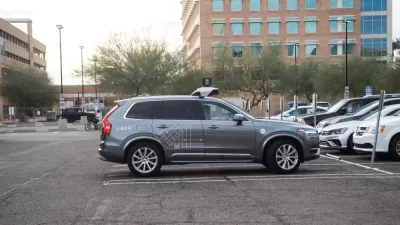Gabe Klein thinks a proposed ban on self-driving cars in Chicago is shortsighted.

John Greenfield recently interviewed Gabe Klein, former transportation chief of the city of Chicago and author of Start-Up City, on the subject of a proposal in Chicago to ban self-driving cars.
Meg Graham reported on the proposed ban in September, in case you missed that story. "Aldermen Ed Burke and Anthony Beale proposed the ordinance Wednesday in a City Council meeting, calling it a 'preemptive strike' after Uber’s announcement it was beginning a pilot of self-driving cars," wrote Graham at the time. The aldermen were unprepared to allow Chicago streets to conduct the "experiment" currently ongoing in Pittsburgh.
Klein's take on the proposed regulation, however, is that the current system of "people-drive cars" is unacceptable. In Klein's own words: "the idea that self-driving cars are going to be less safe is almost impossible. Human error causes 94 percent of car crashes, so the faster we can get people out from behind the wheel of [multi-ton] hunks of metal next to pedestrians and cyclists, the safer our cities will be, the more people will want to live in our cities, the safer and healthier our children will be, because they’ll start walking and biking to school again."
Klein and Greenfield discuss the potential of self-driving cars in much detail—including the role of the taxi industry in opposing self-driving cars in Chicago, the idea that autonomous vehicles will encourage sprawl, and the recently announced federal regulations for self-driving cars.
FULL STORY: Ex-CDOT Chief Klein Discusses Proposed Ban on Self-Driving Cars in Chicago

Maui's Vacation Rental Debate Turns Ugly
Verbal attacks, misinformation campaigns and fistfights plague a high-stakes debate to convert thousands of vacation rentals into long-term housing.

Planetizen Federal Action Tracker
A weekly monitor of how Trump’s orders and actions are impacting planners and planning in America.

San Francisco Suspends Traffic Calming Amidst Record Deaths
Citing “a challenging fiscal landscape,” the city will cease the program on the heels of 42 traffic deaths, including 24 pedestrians.

Defunct Pittsburgh Power Plant to Become Residential Tower
A decommissioned steam heat plant will be redeveloped into almost 100 affordable housing units.

Trump Prompts Restructuring of Transportation Research Board in “Unprecedented Overreach”
The TRB has eliminated more than half of its committees including those focused on climate, equity, and cities.

Amtrak Rolls Out New Orleans to Alabama “Mardi Gras” Train
The new service will operate morning and evening departures between Mobile and New Orleans.
Urban Design for Planners 1: Software Tools
This six-course series explores essential urban design concepts using open source software and equips planners with the tools they need to participate fully in the urban design process.
Planning for Universal Design
Learn the tools for implementing Universal Design in planning regulations.
Heyer Gruel & Associates PA
JM Goldson LLC
Custer County Colorado
City of Camden Redevelopment Agency
City of Astoria
Transportation Research & Education Center (TREC) at Portland State University
Jefferson Parish Government
Camden Redevelopment Agency
City of Claremont




























